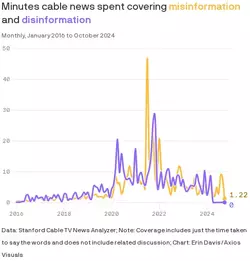America's fact fight fades
Axios (archive.ph)
By Sara Fischer
2025-04-22 09:00:08GMT

Data: Stanford Cable TV News Analyzer; Note: Coverage includes just the time taken to say the words and does not include related discussion; Chart: Erin Davis/Axios Visuals
America's obsession with countering mis- and disinformation has withered as society grows skeptical of institutions once trusted with facts.
Why it matters: Professional fact-checking went mainstream during the first Trump administration, but it's since become politicized.
Axios (archive.ph)
By Sara Fischer
2025-04-22 09:00:08GMT

Data: Stanford Cable TV News Analyzer; Note: Coverage includes just the time taken to say the words and does not include related discussion; Chart: Erin Davis/Axios Visuals
America's obsession with countering mis- and disinformation has withered as society grows skeptical of institutions once trusted with facts.
Why it matters: Professional fact-checking went mainstream during the first Trump administration, but it's since become politicized.
- Americans are less enthusiastic about policing information today than they were two years ago, and the trend is bipartisan, per Pew Research Center.
- A February YouGov poll found that U.S. citizens are far more likely to trust information coming from the Trump administration "a great deal" or "a fair amount" (44%) than they are the news media (28%).
- In 2017, that gap was much smaller, with 43% of Americans saying they trusted the Trump administration "a great deal" or "a fair amount" on facts, compared to 38% for the news media.
- The politicization of fact-checking has contributed to a decline in the number of fact-checking sites globally over the past year, according to data from Duke Reporters' Lab. The number of global fact-checking sites increased 140% from 2016 to 2022, before starting to level off in 2023.
- The State Department's Counter Foreign Information Manipulation and Interference hub is being eliminated, State Secretary Marco Rubio confirmed last week. The office was responsible for tracking and countering foreign disinformation campaigns.
- Meanwhile, the National Science Foundation has canceled research grants related to misinformation and disinformation.
- In a new Pew Research Center survey, 58% of Democrats say they support government restrictions on false information online, down from 70% two years prior.
- TikTok last week said it would test a new feature called Footnotes that lets users add context to videos. The feature is reminiscent of Community Notes on X, which was also adopted by Meta to police speech.
- Meta ended its fact-checking program this year. The company reportedly told teams responsible for ranking content to not penalize misinformation, per Platformer.
- Google in January told the European Union it will not add fact checks to search results and YouTube videos or use them in ranking and removing content, despite the requirements of a new EU law.






